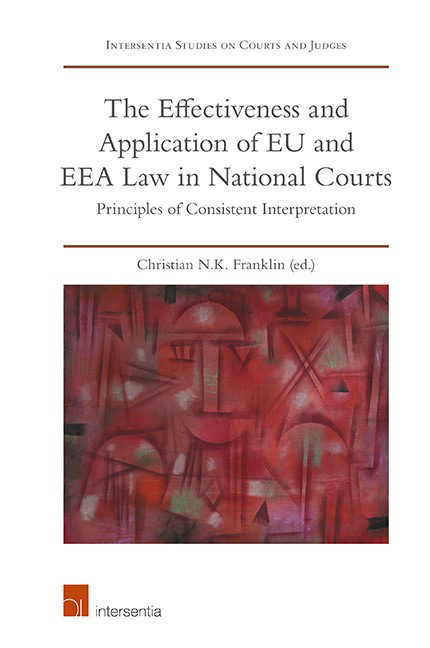 The Effectiveness and Application of EU and EEA Law in National Courts
The Effectiveness and Application of EU and EEA Law in National Courts Published online by Cambridge University Press: 31 January 2019
INTRODUCTION
The Court of Justice of the European Union (ECJ) has developed a number of key principles in order to secure effective and uniform application of EU law throughout the national legal orders of the EU. Primacy, direct effect and the principle of consistent interpretation are core principles in this context. The last of these principles to emerge was the principle of consistent interpretation, established by the ECJ in the Von Colson case. These principles are playing an increasingly important role both in the case-law of the ECJ and in national courts in Europe, when private parties are seeking to have their EU originating rights recognised at the national level. Recently the ECJ has summarised the principle as follows:
The principle that national law must be interpreted in conformity with European Union law also requires national courts to do whatever lies within their jurisdiction, taking the whole body of domestic law into consideration and applying the interpretative methods recognised by domestic law, with a view to ensuring that the directive in question is fully effective and achieving an outcome consistent with the objective pursued by it.
It is also clear from the ECJ ‘ s case-law that the principle should come as the first alternative in order to secure conforming interpretation and application of EU law – before the principle of direct effect, which should be explored if conforming interpretation is not possible.
In European Economic Area (EEA) law, the principle of direct effect is not recognised – in fact, its absence is explicitly confirmed by the European Free Trade Association (EFTA) Court. Therefore, in the national legal orders of the EEA EFTA States, individuals and economic operators are unable to rely directly on non-implemented EEA rules before national courts in the EFTA States (i.e. in Iceland and Norway – Lichtenstein follows a monist tradition). Additionally, while certain primacy obligations are secured through Protocol 35 of the EEA Agreement, this principle is less far-reaching in EEA law than in EU law (see further below). In this sense, it is logical to take the view that a parallel principle of consistent interpretation – as established and developed in the case-law of the EFTA Court – must play an even greater role in EEA law than in EU law.
To save this book to your Kindle, first ensure no-reply@cambridge.org is added to your Approved Personal Document E-mail List under your Personal Document Settings on the Manage Your Content and Devices page of your Amazon account. Then enter the ‘name’ part of your Kindle email address below. Find out more about saving to your Kindle.
Note you can select to save to either the @free.kindle.com or @kindle.com variations. ‘@free.kindle.com’ emails are free but can only be saved to your device when it is connected to wi-fi. ‘@kindle.com’ emails can be delivered even when you are not connected to wi-fi, but note that service fees apply.
Find out more about the Kindle Personal Document Service.
To save content items to your account, please confirm that you agree to abide by our usage policies. If this is the first time you use this feature, you will be asked to authorise Cambridge Core to connect with your account. Find out more about saving content to Dropbox.
To save content items to your account, please confirm that you agree to abide by our usage policies. If this is the first time you use this feature, you will be asked to authorise Cambridge Core to connect with your account. Find out more about saving content to Google Drive.